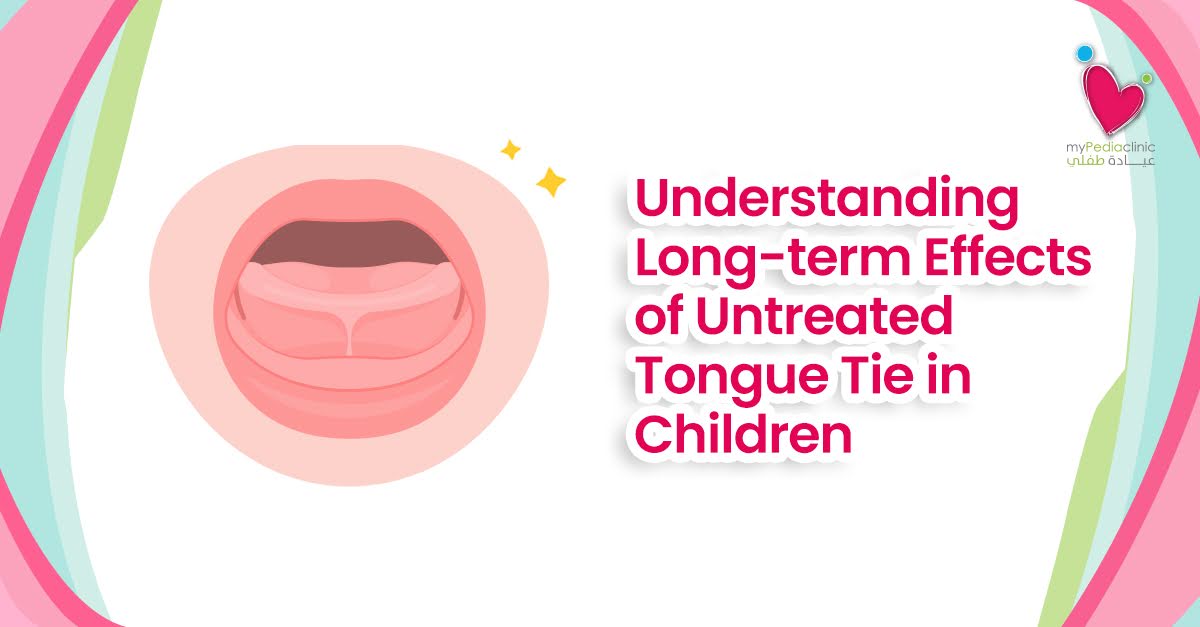Understanding Long-term Effects of Untreated Tongue Tie in Children
Tongue tie, medically known as ankyloglossia, is a condition present from birth that restricts the tongue’s range of motion in children. This occurs when the lingual frenulum—the thin band of tissue connecting the underside of the tongue to the floor of the mouth—is abnormally short, tight, or thick. While some parents may initially dismiss tongue tie as a minor concern, untreated cases can lead to significant long-term effects that impact a child’s development, health, and quality of life. At myPediaClinic Dubai, our experienced pediatric dentists and pediatricians specialize in early tongue tie diagnosis and treatment to prevent these complications and ensure optimal development for your child.
Understanding the potential consequences of untreated tongue tie empowers parents to seek timely professional assessment and intervention when needed.
What is Tongue Tie and How Does It Affect Children?
Tongue tie occurs when the lingual frenulum is too restrictive, limiting the tongue’s ability to move freely. This condition affects approximately 4-11% of newborns, with varying degrees of severity. While some children have mild tongue tie that causes minimal issues, others experience significant restrictions that interfere with essential functions.
The best pediatric dentists in Dubai can identify tongue tie during routine examinations. Early recognition is crucial because the tongue plays vital roles in:
- Breastfeeding and bottle-feeding
- Speech development and articulation
- Chewing and swallowing
- Oral hygiene and self-cleaning of teeth
- Jaw and facial development
- Breathing patterns
Types and Severity of Tongue Tie
Tongue tie classifications range from mild to severe:
Anterior tongue tie: Visible attachment near the tongue tip, often easily identified
Posterior tongue tie: Attachment farther back under the tongue, sometimes harder to detect
Partial tongue tie: Some tongue movement possible but restricted
Complete tongue tie: Severe restriction with minimal tongue mobility
Pediatricians and the best pediatric dentists in Dubai assess tongue tie severity using standardized tools to determine appropriate treatment approaches.
Long-term Effects of Untreated Tongue Tie in Children
1. Speech and Communication Challenges
One of the most significant long-term impacts of untreated tongue tie involves speech development. The tongue must move precisely to produce many speech sounds, and restricted movement can cause persistent articulation difficulties.
Sounds most affected by tongue tie:
- “T,” “D,” “N” (tongue tip to ridge behind front teeth)
- “L” (tongue tip elevation)
- “R” (tongue elevation and curling)
- “S,” “Z” (precise tongue grooving)
- “TH” (tongue placement between teeth)
- “SH,” “CH,” “J” (tongue positioning)
Children with untreated tongue tie may develop compensatory speech patterns, using other oral structures to approximate sounds. These patterns become ingrained over time, making correction increasingly difficult. Speech difficulties can lead to:
- Communication frustration and reluctance to speak
- Social challenges and reduced peer interactions
- Lower self-esteem and confidence
- Academic struggles, particularly in reading aloud
- Need for extensive speech therapy
Speech therapists and the best pediatric dentists in Dubai often work together to address tongue tie-related speech issues. Early treatment can prevent many of these challenges or significantly reduce therapy duration.
2. Feeding and Nutritional Issues Throughout Childhood
While tongue tie feeding problems are most obvious in infancy, they can persist and evolve as children grow:
Breastfeeding difficulties in infants:
- Poor latch leading to inadequate milk intake
- Prolonged feeding sessions causing exhaustion
- Excessive clicking or gulping sounds
- Maternal pain and nipple damage
- Early weaning due to frustration
- Insufficient weight gain and growth
Feeding challenges in older children:
- Difficulty chewing certain food textures
- Messy eating due to limited tongue control
- Gagging on foods
- Limited dietary variety leading to nutritional deficiencies
- Prolonged mealtimes causing family stress
- Social eating challenges affecting confidence
Consultation with pediatric nutritionists and the best pediatricians in Dubai ensures that children with tongue tie receive adequate nutrition despite feeding challenges. However, addressing the underlying restriction often provides the most effective long-term solution.
3. Dental Health and Oral Hygiene Concerns
The tongue plays a crucial role in oral hygiene by naturally cleaning food particles and bacteria from teeth and gums. Untreated tongue tie restricts this self-cleaning function, leading to increased dental problems:
Common dental complications:
- Higher incidence of cavities, particularly on lower front teeth
- Increased plaque buildup and tartar formation
- Gingivitis and gum disease
- Bad breath (halitosis)
- Tooth sensitivity
- Need for more frequent dental interventions
Additionally, restricted tongue movement can make proper brushing and flossing more challenging for children. The best pediatric dental clinic in Dubai provides specialized guidance for oral hygiene management in children with tongue tie while addressing the underlying restriction when appropriate.
4. Impact on Jaw and Facial Development
The tongue exerts constant gentle pressure on the palate and dental arches, playing a crucial role in proper oral and facial development. Untreated tongue tie disrupts this natural process, potentially causing:
Orthodontic and structural issues:
- Narrow, high-arched palate (roof of mouth)
- Dental crowding and misalignment
- Open bite (front teeth don’t meet when mouth closes)
- Crossbite (teeth alignment problems)
- Overbite or underbite development
- Long, narrow facial structure (“long face syndrome”)
- Recessed lower jaw
These structural changes often require extensive orthodontic treatment from the best orthodontists in Dubai. Early tongue tie treatment can prevent or minimize many of these developmental issues, potentially reducing the need for braces or other interventions later.
5. Altered Breathing Patterns and Sleep Issues
Proper tongue posture—with the tongue resting against the roof of the mouth—is essential for nasal breathing and healthy airway development. Tongue tie often prevents this optimal positioning, leading to mouth breathing and associated complications:
Breathing and sleep problems:
- Chronic mouth breathing
- Dry mouth increasing cavity risk
- Obstructive sleep apnea in children
- Snoring and disrupted sleep
- Daytime fatigue and drowsiness
- Difficulty concentrating
- Behavioral issues including hyperactivity
- Impaired learning and academic performance
Research shows connections between untreated tongue tie, mouth breathing, sleep quality, and conditions like ADHD. Pediatricians and airway dentists in Dubai increasingly recognize the importance of addressing tongue tie as part of comprehensive sleep and breathing assessment in children.
6. Emotional, Social, and Psychological Effects
The combined impact of speech difficulties, eating challenges, and dental problems can significantly affect a child’s emotional well-being and social development:
Psychosocial impacts include:
- Self-consciousness about speech clarity
- Embarrassment during mealtimes
- Reluctance to eat in social situations
- Avoidance of speaking in class or groups
- Difficulty making and maintaining friendships
- Lower self-esteem and confidence
- Social anxiety and withdrawal
- Potential bullying or teasing
These psychological effects can persist into adolescence and adulthood if tongue tie remains untreated, emphasizing the importance of early intervention by experienced pediatricians and pediatric dentists in Dubai.
Identifying Tongue Tie in Children: Signs Parents Should Watch For
Early recognition allows for timely treatment. Common signs include:
In infants:
- Difficulty latching during breastfeeding
- Clicking sounds while feeding
- Poor weight gain
- Inability to stick tongue out past lower lip
- Heart-shaped tongue tip when extended
In toddlers and older children:
- Speech sound difficulties
- Limited tongue movement (cannot touch upper lip or palate)
- Difficulty licking ice cream or popsicles
- Challenges with chewing certain foods
- Dental problems despite good hygiene
- Mouth breathing
If you observe these signs, schedule an evaluation with the best pediatrician or pediatric dentist in Dubai for comprehensive assessment.
Treatment Options for Tongue Tie in Dubai
Frenectomy: The Gold Standard Treatment
Frenectomy is a simple, safe procedure to release tongue tie by dividing the restrictive frenulum. At myPediaClinic, the best pediatric dental clinic in Dubai, we perform frenectomies using state-of-the-art radiofrequency equipment, offering several advantages:
Benefits of radiofrequency frenectomy:
- Minimal discomfort during and after procedure
- Little to no bleeding
- Quick healing (typically 1-2 weeks)
- Can be performed on infants through adults
- Immediate improvement in tongue mobility
- Low risk of complications
- Usually completed in single appointment
The procedure is performed under safe local anesthesia (or general anesthesia for very young children if needed), ensuring comfort throughout.
Post-Treatment Exercises and Therapy
After frenectomy, pediatricians often recommend exercises to:
- Strengthen tongue muscles
- Improve range of motion
- Develop proper tongue posture
- Prevent reattachment of tissue
Speech therapy may be beneficial for older children who developed compensatory speech patterns. The best pediatric dentists in Dubai work with speech therapists to create comprehensive treatment plans.
The Importance of Early Intervention
Early tongue tie diagnosis and treatment by the best pediatricians and pediatric dentists in Dubai offers numerous advantages:
Benefits of early treatment:
- Prevents feeding difficulties in infancy
- Supports proper speech development
- Promotes normal jaw and facial growth
- Prevents dental health complications
- Reduces need for extensive speech therapy
- Minimizes emotional and social impacts
- Easier recovery in young children
- More cost-effective than treating complications later
However, it’s never too late to address tongue tie. Children and even adults can benefit from treatment, though earlier intervention typically yields better outcomes.
FAQs: Understanding Long-term Effects of Untreated Tongue Tie in Children
1. At what age should tongue tie be treated in children?
Tongue tie can be treated at any age, but early intervention offers the best outcomes. Many pediatric dentists and pediatricians in Dubai recommend treating symptomatic tongue tie as soon as identified—even in newborns if causing feeding difficulties. For infants, treatment can be performed within the first few weeks of life. For older children, treatment timing depends on symptoms and their impact on development. Early treatment prevents the development of compensatory patterns in feeding, speech, and oral development that become harder to correct over time. Consult the best pediatric dentist in Dubai for personalized timing recommendations based on your child’s specific situation.
2. Can tongue tie affect my child’s teeth alignment and require braces later?
Yes, untreated tongue tie can significantly impact dental alignment and jaw development, potentially necessitating orthodontic treatment. The tongue normally rests against the palate, exerting gentle pressure that helps properly shape the upper jaw and dental arch. With tongue tie, restricted tongue positioning can lead to narrow palates, dental crowding, open bites, crossbites, and other alignment issues. Children with untreated tongue tie often require treatment from orthodontists in Dubai to correct these problems. Early tongue tie release can prevent or minimize orthodontic issues, potentially reducing the need for extensive braces treatment later. The best pediatric dental clinic in Dubai can assess how tongue tie affects your child’s dental development.
3. Will my child’s speech improve after tongue tie release, or will they still need therapy?
Speech improvement after tongue tie release varies based on the child’s age and extent of compensatory speech patterns developed. Younger children (under 3-4 years) who haven’t yet fully established speech patterns often show dramatic improvement with little to no therapy after frenectomy. Older children who’ve developed compensatory articulation patterns typically need speech therapy to retrain proper tongue movements and sound production, though therapy duration is usually shorter than without frenectomy. The best approach combines tongue tie release with speech therapy when needed. Pediatric dentists and speech therapists in Dubai work together to create comprehensive treatment plans ensuring optimal speech outcomes for children of all ages.
4. Is tongue tie surgery painful for children?
Modern tongue tie surgery (frenectomy) is minimally uncomfortable when performed by experienced pediatric dentists in Dubai using current techniques. At myPediaClinic, we use advanced radiofrequency equipment that significantly reduces discomfort, bleeding, and healing time compared to traditional methods. Local anesthesia ensures children feel minimal discomfort during the procedure itself. Post-procedure discomfort is typically mild and manageable with over-the-counter pain relievers. Most children return to normal activities within 24-48 hours. Infants often feed immediately after the procedure. The temporary discomfort of treatment is minimal compared to long-term complications of untreated tongue tie. Our pediatricians and pediatric dentists prioritize comfort and use child-friendly approaches throughout the process.
5. Can tongue tie come back after treatment?
While rare, tongue tie reattachment can occur if proper post-procedure care isn’t followed. The best pediatric dentists in Dubai provide detailed aftercare instructions including specific tongue exercises to prevent reattachment during healing. These exercises keep the release site stretched while tissue heals, preventing the frenulum from reforming. Reattachment is more common when exercises aren’t performed consistently or when the original release was incomplete. At myPediaClinic, our experienced pediatricians and pediatric dentists ensure complete release during the procedure and provide thorough aftercare guidance. Follow-up appointments allow monitoring of healing and tongue mobility to ensure optimal long-term results. With proper technique and diligent aftercare, reattachment is uncommon.
Conclusion: Untreated tongue tie can have far-reaching effects on a child’s speech, feeding, dental health, facial development, breathing, and emotional well-being. Understanding these potential complications empowers parents to seek timely professional evaluation and treatment. At myPediaClinic Dubai, our team of experienced pediatricians and the best pediatric dentists in Dubai specializes in comprehensive tongue tie assessment and treatment using advanced radiofrequency technology. We provide compassionate, expert care to help children overcome tongue tie restrictions and achieve optimal development. Early intervention offers the best outcomes, but it’s never too late to address tongue tie and improve your child’s quality of life. Contact us today to schedule a tongue tie evaluation and take the first step toward better health and development for your child.





